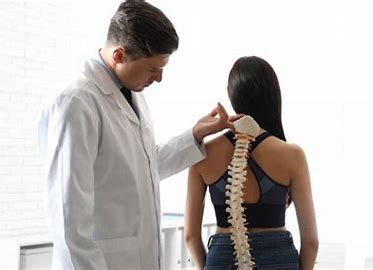Adult scoliosis can be caused by degenerative changes in the spine, such as osteoarthritis or disc degeneration. It may also result from the progression of untreated childhood scoliosis or the development of a new condition in adulthood. Symptoms of adult scoliosis include back pain, stiffness, muscle weakness, and changes in posture. Severe cases may lead to difficulty breathing or walking. Early detection and understanding of these causes and symptoms are essential for appropriate treatment.

The Importance of Seeking Medical Treatment for Adult Scoliosis
Seeking medical treatment for adult scoliosis is crucial to prevent the condition from worsening and to alleviate symptoms. Without treatment, adult scoliosis can lead to chronic pain, decreased mobility, and reduced quality of life. Untreated scoliosis can also result in spinal deformities that may require more invasive interventions in the future. Early diagnosis and intervention can significantly improve outcomes and prevent long-term complications.
Different Types of Doctors Who Treat Adult Scoliosis
Several types of doctors can manage adult scoliosis, including:
- Orthopedic Surgeons: Specialize in the surgical management of spinal deformities.
- Neurosurgeons: Handle cases with neurological symptoms or spinal cord compression.
- Physical Therapists: Provide non-surgical interventions to improve posture, strength, and flexibility.
- Pain Management Specialists: Focus on alleviating chronic pain through various interventions.
- Rehabilitation Specialists: Improve strength and function through targeted therapies.
- Chiropractors: Offer manual manipulation techniques for spinal alignment.
- Rheumatologists: Address autoimmune and inflammatory conditions contributing to scoliosis.

Orthopedic Surgeons Specializing in Adult Scoliosis
Orthopedic surgeons specializing in adult scoliosis have expertise in performing complex spinal surgeries to correct curvature. Techniques may include spinal fusion or spinal instrumentation to stabilize the spine and improve alignment. These surgeons are essential for treating severe scoliosis cases.
Neurosurgeons and Their Role in Treating Adult Scoliosis
Neurosurgeons are critical in managing adult scoliosis, particularly when neurological symptoms are present. If spinal curvature compresses the spinal cord or nerve roots, neurosurgical procedures such as decompression surgeries or spinal cord stimulator implantation may be necessary to relieve pressure and alleviate symptoms.
Physical Therapists and Their Contribution to Adult Scoliosis Treatment
Physical therapists play a vital role in non-surgical scoliosis management. They provide exercises and stretches to improve posture, strengthen muscles, and enhance flexibility. Physical therapy helps reduce pain, improve mobility, and overall function, while also educating patients on proper body mechanics.
Pain Management Specialists for Adult Scoliosis Patients
Pain management specialists are crucial for addressing chronic pain in adult scoliosis patients. They offer interventions such as medication management, nerve blocks, epidural injections, or radiofrequency ablation to alleviate pain and improve quality of life. They work collaboratively with other healthcare providers to develop comprehensive treatment plans.
Rehabilitation and Chiropractic Care for Adult Scoliosis
Rehabilitation specialists and chiropractors offer non-surgical treatments for adult scoliosis. Rehabilitation focuses on enhancing strength and flexibility through targeted exercises, while chiropractors use manual techniques to improve spinal alignment and reduce pain. These approaches can benefit patients with mild to moderate scoliosis.

The Role of Rheumatologists in Treating Adult Scoliosis
Rheumatologists diagnose and manage autoimmune and inflammatory conditions like rheumatoid arthritis or ankylosing spondylitis, which can exacerbate scoliosis. They provide medical management to control inflammation and slow the progression of scoliosis, improving overall outcomes.
Collaborative Approach: Multidisciplinary Teams for Adult Scoliosis Treatment
A multidisciplinary team approach is often necessary for managing adult scoliosis. This team may include orthopedic surgeons, neurosurgeons, physical therapists, pain management specialists, rehabilitation specialists, chiropractors, and rheumatologists. Collaboration among these specialists ensures a comprehensive treatment plan tailored to each patient’s needs, leading to better outcomes.
Emerging Treatment Approaches for Adult Scoliosis
Advancements in medical technology and research have introduced emerging treatment approaches for adult scoliosis. Minimally invasive techniques, such as robotic-assisted surgery or endoscopic procedures, offer reduced surgical trauma and improved recovery times. Non-surgical options, like spinal bracing or specialized exercises, are also being explored as alternatives. These innovations offer hope for enhanced outcomes and quality of life for adults with scoliosis.
Conclusion
Adult scoliosis requires appropriate medical treatment to prevent complications and improve quality of life. Various specialists, including orthopedic surgeons, neurosurgeons, physical therapists, pain management specialists, rehabilitation specialists, chiropractors, and rheumatologists, play a crucial role in managing the condition. A multidisciplinary approach ensures comprehensive care, and emerging treatments offer hope for improved management of adult scoliosis.
References
- [1] National Institute of Arthritis and Musculoskeletal and Skin Diseases. ‘Scoliosis in Adults.’ Available at: https://www.niams.nih.gov/health-topics/scoliosis
- [2] Cleveland Clinic. ‘Adult Scoliosis.’ Available at: https://my.clevelandclinic.org/health/diseases/16860-scoliosis
- [3] Mayo Clinic. ‘Scoliosis in Adults.’ Available at: https://www.mayoclinic.org/diseases-conditions/scoliosis/diagnosis-treatment/drc-20351525
- [4] Spine-Health. ‘Adult Scoliosis Treatment Options.’ Available at: https://www.spine-health.com/conditions/scoliosis/adult-scoliosis
- [5] American Academy of Orthopaedic Surgeons. ‘Scoliosis in Adults.’ Available at: https://orthoinfo.aaos.org/en/diseases–conditions/scoliosis
- [6] WebMD. ‘Managing Adult Scoliosis.’ Available at: https://www.webmd.com/back-pain/adult-scoliosis
- [7] Healthline. ‘Best Braces for Adult Scoliosis.’ Available at: https://www.healthline.com/health/scoliosis-braces
- [8] MedlinePlus. ‘Adult Scoliosis.’ Available at: https://medlineplus.gov/adultscoliosis.html
- [9] Orthopaedic Foundation. ‘Choosing a Scoliosis Brace.’ Available at: https://www.orthopaedicfoundation.org/scoliosis-brace-selection/
- [10] National Scoliosis Foundation. ‘Scoliosis in Adults.’ Available at: https://www.scoliosis.org/scoliosis-in-adults/
- [11] Children’s Hospital of Philadelphia. ‘Adult Scoliosis.’ Available at: https://www.chop.edu/conditions-diseases/scoliosis
- [12] Scoliosis Research Society. ‘Adult Scoliosis Management.’ Available at: https://www.srs.org/professionals/patient-care/adult-scoliosis
- [13] American Association of Neuromuscular & Electrodiagnostic Medicine. ‘Scoliosis Bracing for Adults.’ Available at: https://www.aanem.org/Patients/Disorders/Scoliosis
- [14] Spine Universe. ‘Finding the Right Scoliosis Brace.’ Available at: https://www.spineuniverse.com/conditions/scoliosis/adult-scoliosis-bracing
- [15] Scoliosis.org. ‘Adult Scoliosis Treatment and Bracing.’ Available at: https://www.scoliosis.org/adult-scoliosis-treatment/

